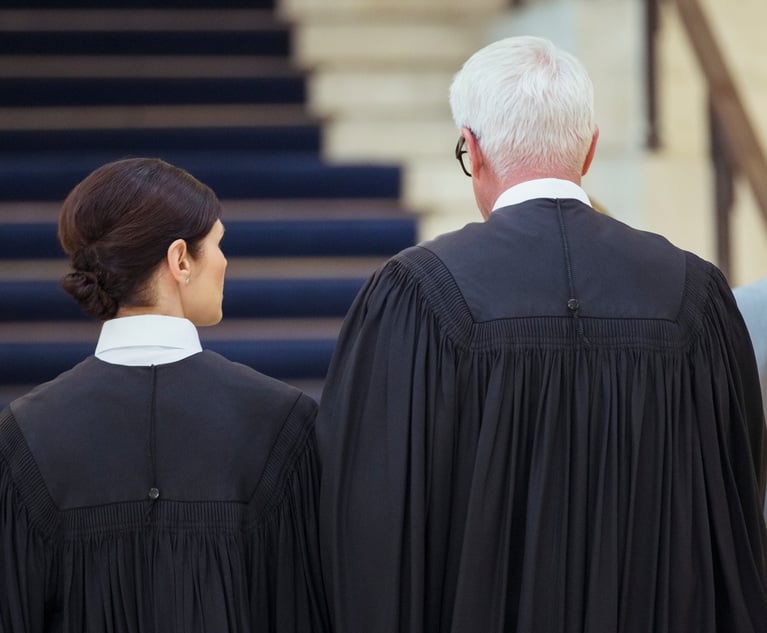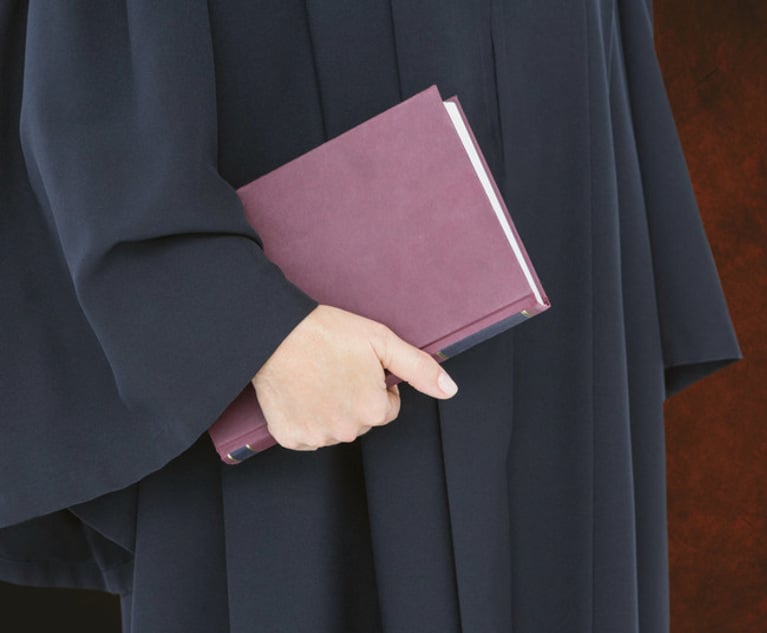A Small Property Tax Case Is a Big Deal for Pro Bono Client
On a fixed income, senior citizen can't pay for courthouse parking, nearly dooming her case.
May 29, 2019 at 07:58 AM
4 minute read
 William Stanhope. (Photo: John Disney/ALM)
William Stanhope. (Photo: John Disney/ALM)As a long-term volunteer with Atlanta Legal Aid, I know that it's often necessary to act fast on our clients' cases. So when I received an email on a Thursday from Cari Hipp, manager of Legal Aid's Tax Appeal Project, I was ready to act.
The client, “Mary,” is a 71-year-old grandmother who lives by herself in a home that was built in the 1950s. Mary called Atlanta Legal Aid because, when she reviewed her 2018 property taxes, she realized the county had increased her property taxes by approximately 3.5 times from the prior year. The county had assessed her property at a value of $81,300, and Mary, who lives on a fixed income, was unable to pay the increased property taxes. Thanks to a letter she received from Atlanta Legal Aid, she knew that she could file an appeal of her purported property value.
I met with Mary on a Friday, the day after learning about her case, and we prepared for her appeal first-thing Monday morning. She was very organized and knowledgeable about her home, but she needed help marshaling the evidence and creating exhibits to submit with a very concise argument in the less than 15 minutes available for our presentation.
On Monday morning, Mary, who has a disability, arrived early to the courthouse. Unable to pay the $12 parking fee at the courthouse, Mary tried to park in the free, on-street handicapped space, but the early morning traffic officers would not let her park until 9 a.m, which is when her hearing was scheduled to start.
The tax appeal board has very strict rules, and if you are late they will rule against you. So I headed back to the hearing room, three minutes late and had to convince the board to let me argue, as they were ready to write their decision.
With less than 15 minutes to make my case, I presented evidence on the value of the property: our comparison properties (“comps”), a map of our comps showing proximity to the subject property, four pages of pictures for conditions, one invoice for needed plumbing repairs and an internet printout on cost to replace asbestos siding. I developed this evidence with direction and support from Atlanta Legal Aid staff attorneys, who are available to lend their subject-matter expertise to all volunteers.
The county appraiser was only willing to drop the condition from “Average” to “Fair,” reducing the value from $81,300 to $77,200. But this was not enough for us; we argued for an even lower assessment. In a close vote, the panel went down to $62,000—an approximate 25% reduction in assessment value and an excellent outcome for Mary.
After the hearing, I went with Mary to the tax assessor's office and helped her complete all the requirements to secure her over-70 senior homestead exemption to further reduce her tax burden. With the help of the expert attorneys on staff at Atlanta Legal Aid, we were able to secure a positive outcome for our client and help her to stay in her home.
I volunteer at Atlanta Legal Aid because everyone should have access to legal representation, and I enjoy ensuring that the most vulnerable populations in our community (like elderly homeowners dealing with tax increases) get the help they need. Volunteering allows me to exercise my legal skills in different areas while making a difference in clients' lives.
I encourage every lawyer to incorporate more pro bono work into their practice—to use their skills and influence to make a positive impact on their community. Atlanta Legal Aid is one organization that addresses the legal needs of people living in poverty, and they rely on volunteer support. With low-income households across Georgia experiencing an estimated three million legal needs per year, the need is great. But if we each step up to meet this need, we can make a positive difference for people like Mary.
William Stanhope is a former president of the Atlanta Legal Aid Society. He is of counsel at Robins Kaplan.
This content has been archived. It is available through our partners, LexisNexis® and Bloomberg Law.
To view this content, please continue to their sites.
Not a Lexis Subscriber?
Subscribe Now
Not a Bloomberg Law Subscriber?
Subscribe Now
NOT FOR REPRINT
© 2025 ALM Global, LLC, All Rights Reserved. Request academic re-use from www.copyright.com. All other uses, submit a request to [email protected]. For more information visit Asset & Logo Licensing.
You Might Like
View All
Spalding Jurors Return $12M Verdict Against State Farm Insurance Client
10 minute read

Trending Stories
- 1Stevens & Lee Names New Delaware Shareholder
- 2U.S. Supreme Court Denies Trump Effort to Halt Sentencing
- 3From CLO to President: Kevin Boon Takes the Helm at Mysten Labs
- 4How Law Schools Fared on California's July 2024 Bar Exam
- 5'Discordant Dots': Why Phila. Zantac Judge Rejected Bid for His Recusal
Who Got The Work
Michael G. Bongiorno, Andrew Scott Dulberg and Elizabeth E. Driscoll from Wilmer Cutler Pickering Hale and Dorr have stepped in to represent Symbotic Inc., an A.I.-enabled technology platform that focuses on increasing supply chain efficiency, and other defendants in a pending shareholder derivative lawsuit. The case, filed Oct. 2 in Massachusetts District Court by the Brown Law Firm on behalf of Stephen Austen, accuses certain officers and directors of misleading investors in regard to Symbotic's potential for margin growth by failing to disclose that the company was not equipped to timely deploy its systems or manage expenses through project delays. The case, assigned to U.S. District Judge Nathaniel M. Gorton, is 1:24-cv-12522, Austen v. Cohen et al.
Who Got The Work
Edmund Polubinski and Marie Killmond of Davis Polk & Wardwell have entered appearances for data platform software development company MongoDB and other defendants in a pending shareholder derivative lawsuit. The action, filed Oct. 7 in New York Southern District Court by the Brown Law Firm, accuses the company's directors and/or officers of falsely expressing confidence in the company’s restructuring of its sales incentive plan and downplaying the severity of decreases in its upfront commitments. The case is 1:24-cv-07594, Roy v. Ittycheria et al.
Who Got The Work
Amy O. Bruchs and Kurt F. Ellison of Michael Best & Friedrich have entered appearances for Epic Systems Corp. in a pending employment discrimination lawsuit. The suit was filed Sept. 7 in Wisconsin Western District Court by Levine Eisberner LLC and Siri & Glimstad on behalf of a project manager who claims that he was wrongfully terminated after applying for a religious exemption to the defendant's COVID-19 vaccine mandate. The case, assigned to U.S. Magistrate Judge Anita Marie Boor, is 3:24-cv-00630, Secker, Nathan v. Epic Systems Corporation.
Who Got The Work
David X. Sullivan, Thomas J. Finn and Gregory A. Hall from McCarter & English have entered appearances for Sunrun Installation Services in a pending civil rights lawsuit. The complaint was filed Sept. 4 in Connecticut District Court by attorney Robert M. Berke on behalf of former employee George Edward Steins, who was arrested and charged with employing an unregistered home improvement salesperson. The complaint alleges that had Sunrun informed the Connecticut Department of Consumer Protection that the plaintiff's employment had ended in 2017 and that he no longer held Sunrun's home improvement contractor license, he would not have been hit with charges, which were dismissed in May 2024. The case, assigned to U.S. District Judge Jeffrey A. Meyer, is 3:24-cv-01423, Steins v. Sunrun, Inc. et al.
Who Got The Work
Greenberg Traurig shareholder Joshua L. Raskin has entered an appearance for boohoo.com UK Ltd. in a pending patent infringement lawsuit. The suit, filed Sept. 3 in Texas Eastern District Court by Rozier Hardt McDonough on behalf of Alto Dynamics, asserts five patents related to an online shopping platform. The case, assigned to U.S. District Judge Rodney Gilstrap, is 2:24-cv-00719, Alto Dynamics, LLC v. boohoo.com UK Limited.
Featured Firms
Law Offices of Gary Martin Hays & Associates, P.C.
(470) 294-1674
Law Offices of Mark E. Salomone
(857) 444-6468
Smith & Hassler
(713) 739-1250







